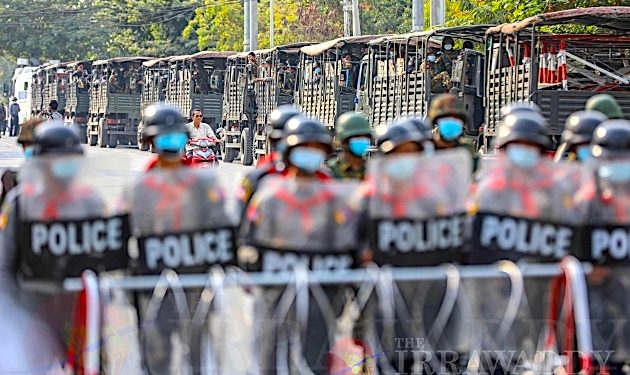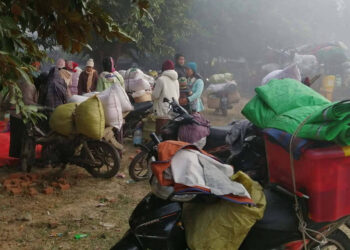The legislative body of Myanmar’s shadow National Unity Government (NUG) has enacted its People’s Police Force Law to regulate law enforcement in areas controlled by resistance forces.
The legislative body, known as the Committee Representing Pyidaungsu Hluttaw (CRPH), represents National League for Democracy parliamentarians ousted in the 2021 coup. Pyidaungsu Hluttaw means Union Parliament.
Under the law, the People’s Police Force will soon be established under the civilian Ministry of Home Affairs and Immigration.
The civilian home affairs and immigration minister U Lwin Ko Latt said: “After we form the police force, we will be able to upgrade law enforcement from accepting complaints to prosecuting.”
The ministry has so far received more than 400 complaints about junta atrocities against civilians.
The CRPH said the law will take legal action against the military leaders who seized power illegally, expose the crimes committed by the regime against civilians and punish the perpetrators and those who misappropriate resources during military rule.
Under the law, police are required to work with the civil administration to prevent crime. The law aims to build a police force that is trusted, respected and relied upon by all ethnicities.
The NUG has primarily installed interim parallel administrations in Sagaing and Magwe regions. The police, people’s administration and justice ministry of the NUG will work together for law enforcement, the shadow government said.
Interim administrations are operating in Indaw, Kyunhla, Wuntho, Katha, Tigyaing, Kanbalu, Banmauk, Pinlebu and Kawlin townships in Sagaing Region and are being expanded to 19 other townships in Sagaing. Six townships have parallel administrations in Magwe Region, according to the NUG’s home affairs ministry.
The NUG’s Ministry of Justice has formed judicial systems in those townships. On April 30, the ministry held a virtual meeting with judges from the 17 townships to discuss the administering of justice.
The People’s Police Force will be formed with striking police officers, those who retired before the coup and civilian volunteers.
The NUG recently said 2,937 striking police officers were working with its ministry, and hundreds more officers who have not joined the civil disobedience movement (CDM) but are assisting the NUG.
Among striking police officers cooperating with the NUG are two majors, 12 captains, 44 lieutenant and 82 second lieutenants, the civilian government claimed.
More than 6,000 police officers have joined the CDM since the coup, according to groups helping those on strike.
Police forces have been formed from striking officers in Kale Township in Sagaing Region and Gangaw District in Magwe Region since December 2021. They work in cooperation with the NUG. In Kayah State, the Karenni State Police has been formed independently of the NUG.
Under the People’s Police Force Law, officers are required to follow the federal charter, human rights norms and respect the customs and traditions of ethnic minorities.
The law bars racial discrimination, torturing prisoners and criminals, abuse of power, and looting and damaging possessions.
You may also like these stories:
Myanmar Junta Rejects ASEAN Envoy’s Request to Meet Shadow Govt Representatives
Myanmar Junta Team to Make 1st Appearance Before ICJ in Rohingya Genocide Case
Junta Watch: Military Throws a Party as COVID Rages; Another ASEAN Snub and More

















